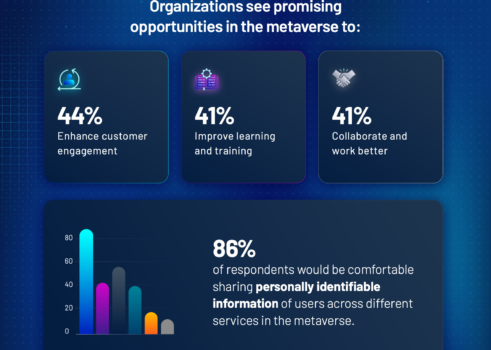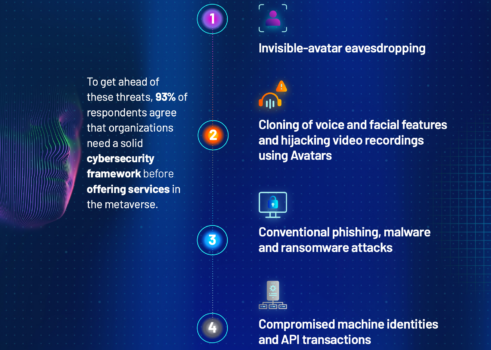
Extra corporations are planning to spend money on the brand new frontier that’s the metaverse, however cybersecurity threats are a prime concern, in accordance with a study launched right this moment by cybersecurity firm Tenable.
The metaverse is envisioned as a 3D model of the web that’s a shared digital area the place individuals spend their digital lives and interact in social actions, procuring, and extra.
The present model of the metaverse is made up of many independent metaverses that don’t essentially work together with one another in any respect. A single unified metaverse is extra of an concept than a actuality, however that’s not stopping tech giants like Meta, Microsoft, and Google from pouring massive cash into it.
And different corporations are leaping on the metaverse bandwagon.
Almost seven out of ten — or 68 p.c — of 1,500 cybersecurity, DevOps, and IT engineering professionals surveyed within the Tenable research said that their organizations have plans to do enterprise within the metaverse within the subsequent six to 36 months, with 23 p.c saying they’ve already begun creating metaverse initiatives prior to now six months.

Firms are cautiously optimistic in terms of delving into the metaverse.
Whereas 86 p.c of these surveyed within the research stated they’d be comfy sharing customers’ personally identifiable info between completely different providers within the metaverse, 93 p.c stated that organizations want a strong cybersecurity framework earlier than providing providers within the metaverse.
Safety leaders should perceive their enterprise’s objectives for the metaverse, stated Bob Huber, chief safety officer at Tenable.
“For sure, safety will lag, however our job stays to allow the enterprise,” Huber advised Hypergrid Enterprise. “If we perceive the objectives of the enterprise, we will set up our danger urge for food for this new market and handle the danger.”
New enterprise alternatives
Firms suppose the metaverse may enhance their enterprise interactions, with 41 p.c seeing improved studying and coaching and 41 p.c seeing distant working and higher collaboration as enterprise alternatives, in accordance with the Tenable research.
Firms additionally hope to extend their revenue margins, with 37 p.c seeing potential new income streams within the metaverse.
And organizations are hoping that the metaverse will enhance how they work together with clients, with 44 p.c saying it may provide enhanced buyer engagement.

Safety is a prime concern
Not all organizations are leaping headfirst into the metaverse, with 41 p.c expressing concern about the safety and security of functions within the metaverse, in accordance with the Tenable research.
Solely 48 p.c of survey respondents are very assured of their organizations’ means to curb cyber threats within the metaverse.
Safety points had been listed as the highest three limitations to entry, with 34 p.c saying the prospect of safety breaches and id theft, 33 p.c saying the dearth of clear processes for knowledge privateness, and 32 p.c saying the dearth of skilled safety professionals is a priority.

Not all safety threats can be new ones, stated Satnam Narang, senior employees analysis engineer at Tenable.
“The older threats, particularly phishing, malware, and ransomware, could have probably the most quick and biggest affect to the organizations creating and internet hosting every metaverse,” Narang advised Hypergrid Enterprise. “This aligns with what we present in our report, with 81 p.c of respondents saying that it’s seemingly or considerably seemingly that these standard assaults might happen within the metaverse.”
One factor that’s sure, stated Narang, is that newer threats will begin to emerge as an issue as soon as the metaverse turns into extra extensively adopted.
“It’s vital that the organizations creating metaverses right this moment do their due diligence to guard their infrastructure from assaults now,” he stated.
And most of these surveyed suppose methods to strengthen the security and safety of operations within the metaverse shouldn’t be left to organizations alone, with 87 p.c saying that the metaverse needs to be regulated.
Of the brand new safety threats posed by the metaverse, cloning of voice and facial options and hijacking video recordings utilizing avatars is seen as the best risk, with 79 p.c saying it is extremely seemingly or considerably prone to happen.
Based on the research, cybersecurity professionals and DevOps managers are involved that there is no such thing as a approach of figuring out who is definitely behind the avatars and that content material saved in a digital surroundings or metaverse platform may be solid and leaked.
Organizations are additionally nervous that attackers may exploit vulnerabilities that permit them to invisibly eavesdrop in VR rooms, with 78 p.c saying these sorts of assaults are very seemingly or considerably seemingly. There’s already research by ScienceDirect exhibiting how this might occur.
Similar to human identities are protected by usernames and passwords, keys and certificates defend machine identities, and these could possibly be weak as corporations interact with varied metaverses.
Pc packages talk with one another via software programming interfaces, which is also compromised within the metaverse.
Nearly 4 in 5 — or 78 p.c — of pros surveyed say compromised machine identities and software programming interface transactions are very seemingly or considerably prone to occur within the metaverse.

Regardless of safety considerations, organizations have some concepts in regards to the steps they should take to assist their metaverse initiatives.
Greater than half — 55 p.c — stated their group would want to coach present staff about protected cybersecurity practices to assist their metaverse funding.
Organizations which are investing or plan to spend money on the metaverse say hiring expertise in specialised areas can be essential, with 52 p.c saying hiring extra IT assist employees, 49 p.c saying hiring extra cybersecurity professionals, and 46 p.c saying hiring extra software program builders is necessary.





![Ethereum [ETH] to $10k: A futile forecast or an affordable wager](https://www.krypticbuzz.com/wp-content/uploads/2023/04/po-2023-04-10T111314.190-1000x600-75x75.png)


